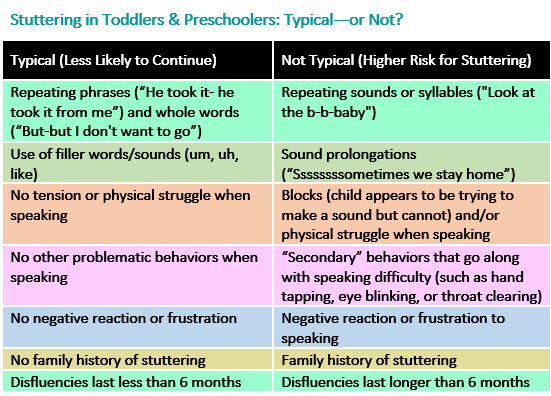No stressful situation occurred at the onset of my stuttering. Im sure that I have never stuttered as child.
 Stuttering In Toddlers Preschoolers What S Typical What S Not Healthychildren Org
Stuttering In Toddlers Preschoolers What S Typical What S Not Healthychildren Org
Your child expresses concerns about speech.

My son is starting to stutter. Be as patient with your child as possible. Frequently repeats the sound at the beginning of a word three or more times ki-ki-ki-ki-kitten. He is due to start full time school in September and during the summer holidays he has developed a bit of a stutter.
Children typically stutter for a few weeks or months and then stop on their own. My therapist and people who stutter PWS say that my story is a bit unusual since Ive started to stutter at age 18. This is when children are starting to combine words and make longer sentences.
Typical developmental stuttering is most likely to happen when the child is tired scared excited or frustrated Child shows great effort andor tension in trying to speak. Childs stuttering occurs throughout the day regardless of the situation. The child may even begin to avoid having to speak.
Deciding whether to take your child to speech therapy can be a difficult decision however. Hi I am after some advice about my 4 year old son. Many toddlers and preschool children stammer or stutter as they learn to speak.
If this was the case Im sure I would remember because it was only a few years ago. Some factors may indicate that your child is more at risk for stuttering. Or it can be the repeated interruption of speech with.
It is not constant most of the time he talks perfectly normally but. Most kids who begin stuttering before the age of 5 stop without any need for help such as speech or language therapy. Knowing these factors will help you decide whether or not your child needs to see a speech therapist.
Stuttering can become a lifelong part of talking for some people. A child may stutter for a few weeks or several months and the stuttering may come and go. Watch for these signs.
It is natural for you to. Your sons stammering is not at all unusual. Its terribly worrying but not at all uncommon for children who start talking early to experience a period of stuttering sometime between 18.
You notice tension facial grimaces or struggle behaviors during talking. Your child avoids situations in which he or she will have to talk. You have a concern about your childs speech.
However it does not have to interfere with your childs ability to make friends participate in the classroom make good grades form lasting relationships or achieve career goals. Stuttering can start suddenly for example a child might wake up one day with a stutter. If youre the parent of a child you think might be stuttering and youre not sure what to do next learning the risk factors is a great place to start.
We know that a child that has a stutter and any of the risk factors outlined below is more likely to have their stutter persist beyond whats considered developmentally normal. It can also build up over time. Sometimes stuttering involves the complete stoppage of speech or the omission of a sound.
About 5 percent of all children stutter at some point in their life. When stuck on a word often replaces the normal vowel sound with uh buh-buh-buh-bicycle. Your child should be evaluated by a speech-language pathologist who specializes in stuttering if.
Some children dont start stuttering until later in childhood. Stuttering affects people of all ages but it most often begins in children ages 2 to 5 as they develop language skills. Stuttering usually starts between the ages of 2 and 5 but it can arise anytime before the teenage years.
Stuttering in children often starts during the preschool years often at 2-4 years. Yesterday August 23 2019 my 14 yr son an I was driving home from my in laws place when all of a sudden he started stuttering an his speech was slow and slurred I took him to the er they asked a bunch of question like if he took any meds that werent his or if he was on any kids of meds cuz if hed it could of built up in his system an it could cause that I throw out the. Children who stop before the age of 5 do not need an intervention.









